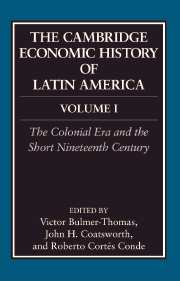Book contents
- Frontmatter
- Introduction
- Part I The Economic Background
- 1 The Global Economic History of European Expansion Overseas
- 2 African Connections with American Colonization
- 3 The Pre-Columbian Economy
- Part II Natural Resources and Factor Endowments
- Part III Economic Organization and Sectoral Performance
- Part IV The Economic Impact of Independence
- Bibliographical Essays
- Index
- References
1 - The Global Economic History of European Expansion Overseas
from Part I - The Economic Background
Published online by Cambridge University Press: 28 March 2008
- Frontmatter
- Introduction
- Part I The Economic Background
- 1 The Global Economic History of European Expansion Overseas
- 2 African Connections with American Colonization
- 3 The Pre-Columbian Economy
- Part II Natural Resources and Factor Endowments
- Part III Economic Organization and Sectoral Performance
- Part IV The Economic Impact of Independence
- Bibliographical Essays
- Index
- References
Summary
INTRODUCTION
Metanarratives about European expansion overseas had appeared even before Columbus claimed Hispaniola for Spain’s Reis Catholicas and da Gama rounded the Cape of Good Hope on his murderous voyage to Calicut. By far the oldest, voluminous and most enduring metanarrative has been dominated by a concern to comprehend the history and nature of European impulses to trade with and to colonize the territories, assets, and populations of other continents. Another recent, more circumscribed discourse in political economy (which will be surveyed and reconstructed by this chapter) can be advertised as an inconclusive attempt to assess the macroeconomic costs and benefits accruing to Europe’s national economies and to Western Europe as a whole from an intensified engagement with Asia, Africa, the Americas, and Australasia. The intensification of an ancient but sporadic and limited involvement with the places, populations, and regional economies of continents outside Europe really began with the Portuguese conquest of Ceuta in 1415 and persisted over some four centuries of mercantilism down to an “imperial meridian” (1783–1825). At that conjuncture in world history (which marked a transition in geopolitics from a mercantilistic to a liberal international economic order), the five European powers most seriously involved with expansion overseas (Portugal, Spain, the Netherlands, France, and Britain) had lost sovereignty over most of their former colonies and trading posts in the Americas, but continued to retain and to extend their empires in South and Southeast Asia, Australasia, and Africa down to an era of decolonization after the Second World War.
- Type
- Chapter
- Information
- The Cambridge Economic History of Latin America , pp. 5 - 42Publisher: Cambridge University PressPrint publication year: 2005
References
- 2
- Cited by

